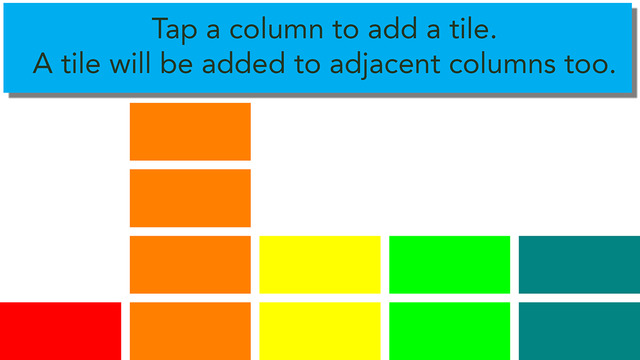

https://itunes.apple.com/us/app/equalise/id955021771?mt=8
Update 3/23/15 Glenn Iba tried to leave a comment in the field below, but was unsuccessful. Here's what he wanted to say:
Turns out that these Equalise puzzles are either trivially solvable, or else impossible.
The solving strategy is to "normalize" each stack to height 1, working from left to right.
This results in all stacks height 1, except the last stack which can have a different height than 1
(if it's 1 then your done).
After normalizing:
For EASY, it's trivial to equalize by incrementing stacks 1 and 2 until they equal the third.
For MEDIUM, again, you can raise stacks 1-5 in "unison" until they equal the 6th stack.
For HARD, if the 8th stack is different from 1, you are out of luck - it's imposible.
The hard puzzles seem to be generated randomly, so that about 1 out of 6 will be solvable.
For IMPOSSIBLE, again the normalization strategy gets you to all stacks 1 except the last
which may be different. If it is different, then it's again impossible.
Sadly, it looks like the impossible levels are NOT generated randomly
-- statistically 1 in 5 should be solvable, but I've sampled over 30,
and none have been solvable.
How do I know all this? I wrote a computer program to search out all solvable positions
for arbitrary number of stacks and max stack height!
My CONCLUSION: These puzzles are interesting for a "computer search hack attack",
but are otherwise not very interesting.
Updeate 3/31 from Glenn: Regarding Equalise -- after looking at GameCenter and seeing that
Updeate 3/31 from Glenn: Regarding Equalise -- after looking at GameCenter and seeing that
the rankings were based on fewest number of moves to solve, I went
back and modified my search program to not only calculate solvability,
but to record the fewest number of moves to "equalize". Armed with
those results, and after trying a large number of Hard levels, I finally
got one that was solvable in 8 moves (beating the previous #1 score of 9 moves for Hard).
Most of the hard problems are impossible, so it involved trying 50 or 60 levels
just to get a sample that were solvable, and the first 10 or so solvable levels took more than
8 moves. Finally I got "lucky" :)
No comments:
Post a Comment